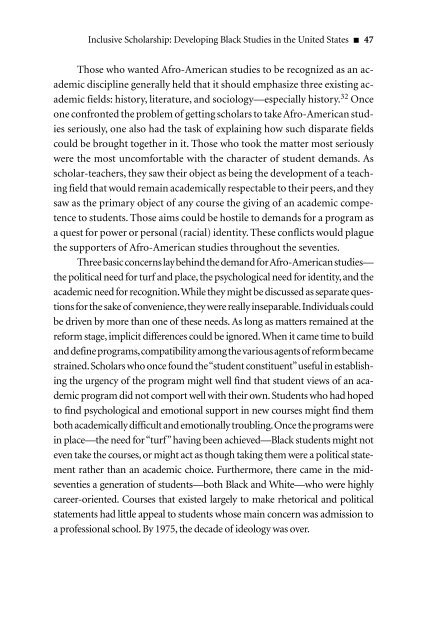Inclusive Scholarship: Developing Black Studies - Ford Foundation
Inclusive Scholarship: Developing Black Studies - Ford Foundation
Inclusive Scholarship: Developing Black Studies - Ford Foundation
Create successful ePaper yourself
Turn your PDF publications into a flip-book with our unique Google optimized e-Paper software.
<strong>Inclusive</strong> <strong>Scholarship</strong>: <strong>Developing</strong> <strong>Black</strong> <strong>Studies</strong> in the United States 47<br />
Those who wanted Afro-American studies to be recognized as an academic<br />
discipline generally held that it should emphasize three existing academic<br />
fields: history, literature, and sociology—especially history. 32 Once<br />
one confronted the problem of getting scholars to take Afro-American studies<br />
seriously, one also had the task of explaining how such disparate fields<br />
could be brought together in it. Those who took the matter most seriously<br />
were the most uncomfortable with the character of student demands. As<br />
scholar-teachers, they saw their object as being the development of a teaching<br />
field that would remain academically respectable to their peers, and they<br />
saw as the primary object of any course the giving of an academic competence<br />
to students. Those aims could be hostile to demands for a program as<br />
a quest for power or personal (racial) identity. These conflicts would plague<br />
the supporters of Afro-American studies throughout the seventies.<br />
ThreebasicconcernslaybehindthedemandforAfro-Americanstudies—<br />
the political need for turf and place, the psychological need for identity, and the<br />
academic need for recognition.While they might be discussed as separate questions<br />
for the sake of convenience,they were really inseparable.Individuals could<br />
be driven by more than one of these needs. As long as matters remained at the<br />
reform stage, implicit differences could be ignored.When it came time to build<br />
anddefineprograms,compatibilityamongthevariousagentsof reformbecame<br />
strained.Scholars who once found the“student constituent”useful in establishing<br />
the urgency of the program might well find that student views of an academic<br />
program did not comport well with their own. Students who had hoped<br />
to find psychological and emotional support in new courses might find them<br />
both academically difficult and emotionally troubling.Once the programs were<br />
in place—the need for“turf”having been achieved—<strong>Black</strong> students might not<br />
even take the courses, or might act as though taking them were a political statement<br />
rather than an academic choice. Furthermore, there came in the midseventies<br />
a generation of students—both <strong>Black</strong> and White—who were highly<br />
career-oriented. Courses that existed largely to make rhetorical and political<br />
statements had little appeal to students whose main concern was admission to<br />
a professional school. By 1975, the decade of ideology was over.

















